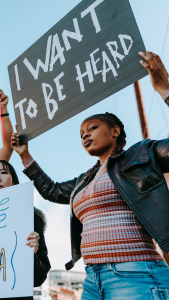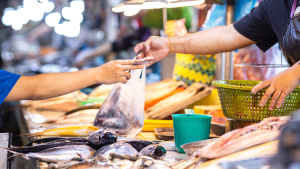This article has first been published in INFOFISH International
— By Shannon Hardisty
How do you know if the fish on your plate was caught by someone independent or by a victim of forced labour? Your answer may be that you don’t, that it doesn’t matter, or most likely because certifications and ethical retailers have assured you that it is. In other words, it’s a belief based on trust, but is this trust warranted? Consumers have been concerned about the environmental impacts of their seafood choices for a long time. However, there is an increasing awareness and questioning of the human and labour rights issues that lurk beneath the surface, the proper observance of which may be genuine or misleading – this is known as “fairwashing”. As a result, the seafood industry must take steps towards addressing these concerns.
Fairwashing primarily refers to when companies misrepresent how fair and equitable their labour practices are regarding wages and equality. It involves companies attempting to create a facade of fairness and ethical labour practices whilst not following through on their commitments through dishonest or misleading marketing claims1 . Fairwashing can take different forms, including explicit false claims or more subtle tactics, s

uch as using vague and meaningless language like “made with care” while ignoring fair wage considerations, labour laws, and transparency. Companies engage in fairwashing to avoid taking accountability for poor labour practices, to maintain a positive reputation, and increase margins by not paying workers fairly. Even if these activities are unintended in some situations, they still damage companies’ efforts to establish truly responsible models and mislead consumers who want to do the right thing. The significance of fairwashing lies in its ability to mislead consumers and prevent them from making informed choices when supporting ethical brands. When companies falsely claim to have fair labour practices, conscious consumers might unknowingly endorse brands that do not genuinely prioritize workers’ welfare.
Before diving into what fairwashing means for the seafood industry and those who depend on it, it’s crucial to understand the difference between fairwashing and its sibling concept, greenwashing. Like greenwashing, fairwashing is the use of misleading marketing tactics by companies to reassure consumers, making it difficult for them to make informed choices and diverting support and attention from genuinely responsible brands or businesses. Greenwashing refers to companies implying they are more sustainable or environmentally-friendly than they actually are. It occurs when companies exaggerate or falsely claim to have environmentally-friendly practices, products, or initiatives. A company may label a product as “eco-friendly” or “green” when it is not, use specific packaging, or emphasize one green aspect of its business to divert attention from other unsustainable practices. An example of this in the seafood industry is when products may be labelled as “line-caught”; in this instance, consumers may assume that the tuna was caught using one-by-one methods such as pole-andline or handline, whilst, in reality, it may have been taken by a longline which is a passive fishing gear with thousands of small hooks leading to high levels of bycatch and bycatch mortality. Conversely, fairwashing focuses on labour and social responsibility practices; the ethics in the supply chain such as under-payment, forced labour, exploitative conditions; or portraying marginalized communities in marketing campaigns where the company’s sourcing does not benefit these communities (or only by a tiny percentage)2 . It occurs when companies misrepresent or exaggerate how fair and equitable their labour practices are, particularly regarding wages and worker treatment. Fairwashing involves creating a misleading image of ethical labour practices through marketing, even when the company’s actions do not align with these claims. Companies engaging in fairwashing may use deceptive language such as “supports local” or showcase diversity and inclusion efforts without addressing deeper systemic issues within their workforce.
In the seafood sector, concerns about fairwashing primarily revolve around the potential for companies to misrepresent or exaggerate the fairness and ethicality of their labour practices through deceptive marketing tactics. Fairwashing in the seafood industry can mislead consumers and hinder their decision-making about supporting genuinely socially-responsible brands. In addition to the examples of fairwashing highlighted above, some significant concerns related to fairwashing in the seafood sector include the following:

Companies have a responsibility to ensure due regard for their workers’ human and labour rights.
A broken economic model lies at the core of fairwashing in the seafood industry. It is a sector where the confluence of factors, including surging global demand for seafood, dwindling fish stocks, and escalating operational costs, should logically lead to higher prices. However, the paradox is that prices fail to rise and are subject to market pressures that drive them down. The repercussions of this economic paradox are far-reaching.
One of the most pressing issues arising from this skewed economic model is the prevalence of labour exploitation and human rights abuses within the industry. As retailers grapple with the increasing consumer demand for affordable seafood, they exert immense pressure on their suppliers to procure cheaper seafood. Suppliers, aware that consumers and thus retailers will often opt for cheaper alternatives, are compelled to minimize production costs, leading to adverse labour conditions, underpayment, and poor treatment of workers. Vulnerable populations, such as migrant labourers, often bear the brunt of these abuses.
Another aspect of this model is the interplay of market dynamics, retailer pressures, and competition between suppliers, which foster false price ceilings, contributing to a perilous race to the bottom regarding seafood prices. The consequences of this race extend beyond mere economics. They perpetuate an environment conducive to exploitative practices, putting the well-being and rights of workers at risk. The demand for cheap fish, while catering to consumer preferences, also inadvertently fuels exploitative labour practices, perpetuating a cycle that undermines human rights.
The increasing scrutiny of labour rights and human rights within supply chains has resulted in the development of various voluntary, non-governmental social governance tools such as commitments, labelling schemes, ethical standards, codes of conduct, and certification schemes3 . Ethical certifications offer consumers confidence in a brand’s commitment to fairness. Seeking recognized ethical certifications and adhering to their stringent standards assures consumers that labour practices align with established ethical norms. While a well-intentioned approach to assessing and ensuring ethical and fair practices within companies, ethical audits are only sometimes reliable for combatting fairwashing due to several inherent limitations and challenges. The parameters to watch in conducting truly ethical audits are outlined below.
In the seafood industry, standard-setting methods start with environmental standards and “add-on” labour standards or adapt environmental norms for labour and human rights, given the absence of operational advantages for workers’ rights. The dimensions of these mechanisms may be based on the principles applied by environmental non-governmental organizations (NGOs) in seafood product supply chains in the absence of workers or tripartite procedures with worker representatives. They start with relation-less ecological boundaries and norms that don’t consider power structures. Because of this, combining human and labour rights standards with environmental standards may seek to equate these sustainability pillars and mislead the worker perspective. Furthermore, the auditing process may only partially accommodate these additional social requirement needs.
In other cases, the social components have been superficially addressed by a requirement of self-declarations that do not undergo third-party validation. Not ideal for obvious reasons, but there also is a relationship between the perception of the methods of the environmental component of the certification and this added-on social component – because the ecological component is so rigorous, the assumption is made that the social declarations undergo a similar process. Whilst the documents may be self-declarations, the certifier/standard holder is responsible for clarifying that this does not purport that the organization is considered ethical by the standard; without this explicit statement, they perpetuate fairwashing by omission.
The social and ecological aspects of fishing activity are not interchangeable. On the other hand, they could reinforce one another, as seen in the established link between illegal, unregulated, and unreported (IUU) fishing and labour rights violations. When it comes to voluntary standards, there is a glaring difference between social and ecological standards. This is because ecosystem health is more objective and visible to outside observers. After all, it is not based on subjective interpretation tainted by racism, xenophobia, and other systemic and inter-sectional forms of discrimination or power dynamics.
Furthermore, data indicates that combining social and environmental norms might serve as a cover for eliminating labour rights and diverting attention away from concerns about working conditions. Furthermore, many tools have been developed to suit Western ideals and expectations regarding certifications; for example, requiring formal records of grievance mechanisms or financial loan systems and possibly requiring (historical) data that small-scale fishers cannot capture due to irrelevance and capacity within the fishery. This automatically excludes fisheries which may be more ethical, as it needs to account for the sociopolitical dynamics typical within remote, small-scale fisheries.
Whilst no tool is immune to being used for fairwashing, some certifications and tools genuinely assess and accurately report on the social conditions within a supply chain, or section of the supply chain. Some of the indicators of these tools include the following:
Worker-driven solutions
Fishers have the most invested interest in their working conditions and thus are their own best representatives in developing responses to these issues. According to Decker Sparkst et al.4 , sector-wide, worker-driven labour and human rights initiatives have produced the following results in different industries:
Continuous engagement
Many certifications require annual audits, but those that also demand evidence of continuous and proactive engagement with workers are better equipped to identify worker maltreatment or abuse indicators. Fairtrade USA is an example of such a certification. Each actor in the supply chain should engage in this type of ongoing communication with workers, regardless of the certification requirements.
So, how do you know if the fish on your plate was caught by someone who is independent or a victim of forced labour? It is a matter of trust. However, it is not a passive or implicit trust, but one that needs constant evaluation and is held to a high standard. From catch-to-kitchen, every actor within the seafood supply chain has a role to play. Historically, environmental and social tools have been developed through stakeholder groups dominated by industry and NGOs. However, worker voice and worker representation can play a crucial role in combatting fairwashing by adding a layer of accountability and transparency within companies. Here’s how these mechanisms can help address fairwashing:
Championing worker voice
 Workers involved in production processes often know first-hand how a company operates. They can serve as whistleblowers, exposing any deceptive or misleading greenwashing practices within the organization. When workers are given a platform to speak openly about their company’s practices, their testimonies carry credibility. Their personal experiences and insights can be robust evidence to verify or debunk fairwashing claims. This can be incredibly impactful when shared with consumers, investors, or regulatory bodies. By sharing their insights, workers can provide concrete evidence to the public, regulators, or advocacy groups about discrepancies between a company’s environmental claims and its actual practices.
Workers involved in production processes often know first-hand how a company operates. They can serve as whistleblowers, exposing any deceptive or misleading greenwashing practices within the organization. When workers are given a platform to speak openly about their company’s practices, their testimonies carry credibility. Their personal experiences and insights can be robust evidence to verify or debunk fairwashing claims. This can be incredibly impactful when shared with consumers, investors, or regulatory bodies. By sharing their insights, workers can provide concrete evidence to the public, regulators, or advocacy groups about discrepancies between a company’s environmental claims and its actual practices.
Recognition within the organization
When workers have a say in a company’s decision-making, they can advocate for ethical and sustainable practices. This can result in genuine social and environmental policies being implemented. Companies can ensure they adhere to their corporate social responsibility (CSR) commitments by including worker representation in sustainability committees. Workers can also push for transparency and accountability, creating a more positive work environment. Companies need to provide their employees with a platform to share their insights; advocate for fair treatment; and ensure accountability to move towards genuine responsibility and transparency. When these mechanisms are initiated from the top-down, they help organizations mitigate the risks of unfair working conditions. However, it is important to note that the responsibility for ensuring ethical working conditions falls on the companies, not their workers. While worker voice and representation are powerful tools in the fight against fairwashing, companies should continuously question their status quo and strive to do more for their workers and minority groups. We cannot expect workers to be solely responsible for speaking up when problems arise. Instead, we should expect companies to take a proactive approach towards maintaining ethical working conditions.
Companies have a clear responsibility to identify and avoid fairwashing practices; However, they often also lack the resources or knowledge of where to start. Here are some clear examples and solutions to consider:

Informed consumers can help to weed out fairwashing practices by insisting on ethically-sourced seafood.
Companies alone cannot bear the responsibility in the quest for ethical seafood; consumers, too, play a pivotal role. To meet consumer expectations for ethical seafood, the following actions are imperative:
The sustainable seafood movement, comprising NGOs, government bodies, retailers, and consumers, is pivotal in addressing fairwashing issues. To proactively address these challenges, the movement should:
Why aren’t we talking about fairwashing as much as we do about greenwashing? Fairwashing poses formidable challenges to the seafood industry’s endeavours to promote ethical trade and human rights. Distinguishing fairwashing from greenwashing is pivotal in addressing these concerns effectively, and we should give more attention to fairwashing in our industry in general.
Companies must prioritize transparency, fair pricing, ethical certifications, and regular labour audits to mitigate fairwashing and meet consumers’ ethical standards and expectations. Ensuring that socially-responsible best practices are occurring throughout any supply chain is paramount. While supporting one-by-one tuna fisheries, the International Pole and Line Foundation (IPNLF) is a leader in shifting the global narrative towards responsible seafood, which duly considers the local, social, and economic impacts and human rights issues in fisheries. As such, securing, safeguarding, and building opportunities for coastal communities to participate in highly-competitive global seafood markets is a crucial area of our work.
By rectifying the broken economics of the seafood sector and supporting fair labour practices, we can transition toward an equitable and fair seafood industry that safeguards human rights, particularly vulnerable populations, while ensuring that ethical trade prevails.

Shannon Hardisty is Social Responsibility Director at the International Pole and Line Foundation (IPNLF). She leads the charity’s work in understanding, enhancing and evidencing the social benefits of one-by-one tuna fisheries; provides social responsibility guidance to market actors, NGOs and advocacy groups; and drives IPNLF’s agenda on social equity issues faced by small-scale fisheries. Shannon completed an MSc. (res) investigating smallscale fisher livelihoods and marine protected areas at Rhodes University (South Africa) and has BSc degrees in Zoology and Environmental Science. Her other academic outputs include marine livelihoods, poverty alleviation in Kenya, and microplastic distribution pattern research.